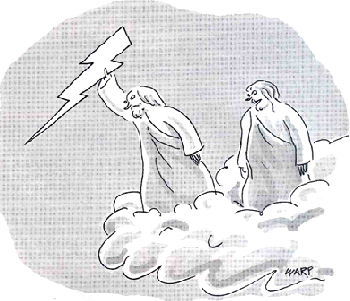This coming Sunday we are reading the story of when David ascends to the throne and becomes King of Israel (2 Chronicles 6). In the story itself, we read where David is transporting the Ark of the Covenant (remember the Indiana Jones movie about the Ark of the Covenant?). In the story, the
This particular story tells of a time when the God who we know today was at one time, a very unpredictable, sometimes angry, and sometimes benevolently gracious Being. All through the Old Testament, a reader can find instances when God would strike out and kill many because of God’s wrath. A reader can also find places where God’s spokespersons sometimes talked God out of killing even more people because of God’s sometimes fickle and very arbitrary moods.
Today we worship a very different God. To some, we are living in a different dispensation, or period of time when God, well…acts differently. Those who consider themselves dispensationalists, they see the God of the New Testament as being a more gracious God and the God of the Old Testament. Rather than saying that God may be scitsophrenic, they say that God has chosen to act differently (for whatever reason).
For liberals and progressive Christians, we often view God as a sort of hippie type who, after a few tokes and wearing a tie-dye t-shirt, asks politely and reverently, “Come on man, let’s all just get along, okay?” Okay, so few actually think that God gets stoned but they idea that God is a 60s peace-Child is a very different image than that of the God of Israel.
and reverently, “Come on man, let’s all just get along, okay?” Okay, so few actually think that God gets stoned but they idea that God is a 60s peace-Child is a very different image than that of the God of Israel.
All this causes me to wonder: are we right in thinking that the arbitrary anger and fickle moodiness of God are really over? Or, was God ever like that to begin with?
One tenet of liberal Christianity is that when we look at the Bible or the Holy Scriptures, we see the book in a different light than a conservative fundamentalist might. One way we look at it is as a collection of stories explaining how men and women of faith have interpreted their relationship with God. Some of them interpreted God as a Zeus-like figure who sometimes tormented us for reasons we’ll never know. Others saw God as a benevolent God who sought out opportunities to show grace. And still others, who read the Bible from a literary perspective see the theology of God developing as time went on.
have interpreted their relationship with God. Some of them interpreted God as a Zeus-like figure who sometimes tormented us for reasons we’ll never know. Others saw God as a benevolent God who sought out opportunities to show grace. And still others, who read the Bible from a literary perspective see the theology of God developing as time went on.
Elaine Pagels, a professor of religious studies at
This then, brings me back again to my original question: Have we turned God into a wuss or, have we simply misunderstood God all along?
Hopefully by Sunday I’ll have read more and can offer some insight about this very question to the folks who will be gathering here.







No comments:
Post a Comment